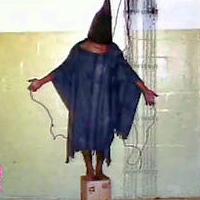Never Again, Part Two...

This kind of scene can also be found at Abu Ghraib: ''An 18 November 2003 photograph depicts a detainee dressed in a shirt or blanket lying on the floor with a banana inserted into his anus. This as well as several others show the same detainee covered in feces, with his hands encased in sandbags, or tied in foam and between two stretchers.'' This, apparently, was a result of self-inflicted mania, although where the mentally ill man procured a banana is not elaborated upon.
Also notable in Abu Ghraib was the despicable use of religion to humiliate. One Muslim inmate was allegedly forced to eat pork, had liquor forced down his throat and told to thank Jesus that he was alive. He recounted in broken English:
''They stripped me naked, they asked me, 'Do you pray to Allah?' I said, 'Yes.' They said 'F - - - you' and 'F - - - him.' '' Later, this inmate recounts: ''Someone else asked me, 'Do you believe in anything?' I said to him, 'I believe in Allah.' So he said, 'But I believe in torture and I will torture you.' ''
...And the damage done was intensified by President Bush's refusal to discipline those who helped make this happen. A president who truly recognized the moral and strategic calamity of this failure would have fired everyone responsible. But the vice president's response to criticism of the defense secretary in the wake of Abu Ghraib was to say, ''Get off his back.'' In fact, those with real responsibility for the disaster were rewarded. Rumsfeld was kept on for the second term, while the man who warned against ignoring the Geneva Conventions, Colin Powell, was seemingly nudged out. The man who wrote a legal opinion maximizing the kind of brutal treatment that the United States could legally defend, Jay S. Bybee, was subsequently rewarded with a nomination to a federal Court of Appeals. General Sanchez and Gen. John P. Abizaid remain in their posts. Alberto R. Gonzales, who wrote memos that validated the decision to grant Geneva status to inmates solely at the president's discretion, is now nominated to the highest law enforcement job in the country: attorney general. The man who paved the way for the torture of prisoners is to be entrusted with safeguarding the civil rights of Americans. It is astonishing he has been nominated, and even more astonishing that he will almost certainly be confirmed.
But in a democracy, the responsibility is also wider. Did those of us who fought so passionately for a ruthless war against terrorists give an unwitting green light to these abuses? Were we naïve in believing that characterizing complex conflicts from Afghanistan to Iraq as a single simple war against ''evil'' might not filter down and lead to decisions that could dehumanize the enemy and lead to abuse? Did our conviction of our own rightness in this struggle make it hard for us to acknowledge when that good cause had become endangered? I fear the answer to each of these questions is yes.
American political polarization also contributed. Most of those who made the most fuss about these incidents - like Mark Danner or Seymour Hersh - were dedicated opponents of the war in the first place, and were eager to use this scandal to promote their agendas. Advocates of the war, especially those allied with the administration, kept relatively quiet, or attempted to belittle what had gone on, or made facile arguments that such things always occur in wartime. But it seems to me that those of us who are most committed to the Iraq intervention should be the most vociferous in highlighting these excrescences. Getting rid of this cancer within the system is essential to winning this war.
I'm not saying that those who unwittingly made this torture possible are as guilty as those who inflicted it. I am saying that when the results are this horrifying, it's worth a thorough reassessment of rhetoric and war methods. Perhaps the saddest evidence of our communal denial in this respect was the election campaign. The fact that American soldiers were guilty of torturing inmates to death barely came up. It went unmentioned in every one of the three presidential debates. John F. Kerry, the ''heroic'' protester of Vietnam, ducked the issue out of what? Fear? Ignorance? Or a belief that the American public ultimately did not care, that the consequences of seeming to criticize the conduct of troops would be more of an electoral liability than holding a president accountable for enabling the torture of innocents? I fear it was the last of these. Worse, I fear he may have been right.
Andrew Sullivan, New York Times Book Review

0 Comments:
Post a Comment
<< Home